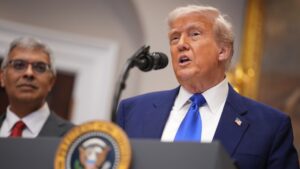Trump’s Push for Prescription Drug Price Reform: What You Need to Know
President Donald Trump recently made headlines by announcing an ambitious executive order aimed at lowering prescription drug prices in the United States. This initiative, which links drug prices to those in other developed countries, has stirred a mix of hope and skepticism among experts and investors alike. Here’s what we know, how it could impact patients and the pharmaceutical industry, and what it means for investors.
Aiming for Change
Trump signed an executive order that aims to implement a "most favored nation" policy. This policy seeks to equalize drug prices by tying U.S. prices to significantly lower prices in countries such as Canada and many European nations. According to Trump, this could potentially reduce drug prices by anywhere from 59% to as much as 90%. However, experts caution that such claims need to be met with skepticism, as the details and applicability of the policy remain murky.
The Context of Drug Pricing
The U.S. has long grappled with exorbitant drug prices, which can be two to three times higher than in other developed nations. This disparity has not only burdened consumers but has also sparked ongoing debates among policymakers. According to the Rand Corporation, certain U.S. medications can cost up to ten times more than their counterparts overseas.
While the promise of significant savings sounds appealing, the practical execution of this policy is fraught with complications. For one, it could encounter legal challenges from pharmaceutical companies—just as a similar initiative faced in Trump’s first term.
Immediate Reactions from the Market
Investors appeared generally unfazed by Trump’s announcement. Major pharmaceutical companies like Gilead and Merck even saw positive stock movements, with shares rising 7% and 5% respectively. This immediate market response seems to reflect investor skepticism regarding the actual implementation of the proposed changes.
Expert Opinions
JPMorgan analysts highlighted that achieving the objectives outlined in Trump’s executive order would be "challenging to practically implement." They noted that the plan might need congressional approval, making its execution uncertain.
Current laws surrounding drug pricing are already complex, and many experts argue that simply creating policies without a solid framework will only lead to more obstacles. Gerard Anderson, a health policy expert, noted that expecting drug companies to lower their prices voluntarily is a significant hurdle.
What’s Next for Patients?
One of the most pressing concerns is how and when these changes will actually impact patients. The Trump administration has suggested that some drug prices could drop "almost immediately,” but specifics regarding which medications will be included remain unclear. Health experts fear that without defined parameters, the promised benefits could largely miss the mark.
The executive order also hints at allowing U.S. patients to buy drugs directly from manufacturers, cutting out middlemen. However, without additional details on these programs, how beneficial they will be to consumers is uncertain.
Implications for the Pharmaceutical Industry
The pharmaceutical sector has expressed concern over Trump’s proposed policies. PhRMA, the largest pharmaceutical lobbying group, fears that a "most favored nation" policy could severely impact revenues and stifle innovation in drug development. BMO Capital Markets even estimated potential losses exceeding $1 trillion for drugmakers over the next decade if similar policies are enacted.
While some analysts view this executive order as a "headline risk," they also acknowledge that the uncertainty of implementation might bring temporary relief to the pharmaceutical industry.
A Better Path Forward?
Instead of complicating the system with new policies, many experts argue that the administration could utilize existing frameworks, such as Medicare’s drug price negotiations. This approach has already been integrated into the Biden administration’s Inflation Reduction Act, which allows for negotiations on specific medications.
JPMorgan analysts suggest starting negotiations with a "most favored nation" price as a benchmark could streamline the process, lessening the burden on both drugmakers and patients.
Why Extreme Investor Network?
Understanding the intricate dance of policies, market responses, and investment opportunities is vital in today’s environment. At Extreme Investor Network, we strive to provide our readers with in-depth analysis and forecasts that not only dissect current events but also guide you on positioning for future success. Stay ahead of the curve—subscribe for insights that could enhance your investment strategy!

